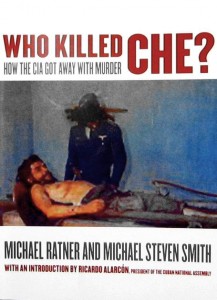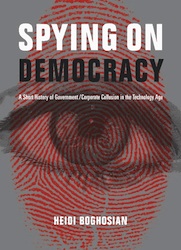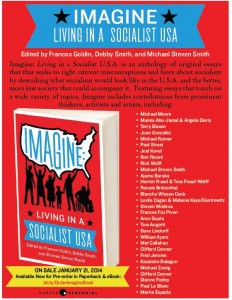Afghanistan War, Civil Liberties, Criminalizing Dissent, FBI Intrusion, Habeas Corpus, Human Rights, Iraq War, NSA Spying, Surveillance, Targeting Muslims, Truth to Power
Podcast: Play in new window | Download
Updates:
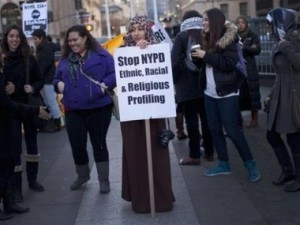

NJ Federal Court Dismisses NYPD Spying On Muslims Case
We take a look into the failed lawsuit challenging the New York City Police Department’s broad surveillance of Muslims in New Jersey. As listeners may know the case Hassan v City of New York brought by the Center for Constitutional Rights and Muslim Advocates was dismissed last month. Since 2002, the NYPD spied outside its jurisdiction on at least 20 mosques, 14 restaurants, 11 retail stores, two grade schools and two Muslim Student Associations in New Jersey. The monitoring included using racial and ethnic profiling systems, video surveillance, photographing, community mapping and infiltration.
Professor Deepa Kumar:
- It was very troubling for me too Michael. At Rutgers where I teach, we found out that the NYPD had a safe house just off of our New Brunswick campus.
- It’s really troubling that student groups on my campus not to mention grade schools and Muslim book stores and community centers have been invaded.
- It’s created a chilling sentiment among the Muslim community. People self-censor, they’re afraid that what they say will be used against them in entrapment cases.
- This decision by this judge is completely stunning. The logic that he puts forward and I’m reading from his ten page report. He says “the police could not have monitored New Jersey for Muslim terrorist activities without monitoring the Muslim community itself. The motive for the program was not solely apparently to discriminate against Muslims but to find Muslim terrorists hiding among ordinary law abiding Muslims.”
- If you examine what he says, the notion that there are terrorists in the Muslim community, therefore its alright to go out and spy on them.
- It’s based on the notion that somehow Islam serves to radicalize Muslim Americans into performing political violence.
- This program has been active since 2002, but there hasn’t been one terrorism related lead, let alone any kind of conviction.
- Since the events of 9/11 there have been all sorts of pseudo-scientific attempts to show that somehow the religion Islam creates political violence.
- If you look at Hamas, the group in Palestine, they’ve gone to the Quran to justify violence as well as to justify cease fire.
- It’s politics really as the key reason why people turn to violence and so to somehow blame Islam, this is a form of cultural racism.
- What this means is that the NYPD can go around with impunity and spy on religion minorities, not just in New York City, but in New Jersey, in Connecticut.
- It sends a green light to other police departments across the country as well as the FBI which has similar programs.
- He (Judge Martini) justified his ruling referring to a case in the Supreme Court. I think we have a lot of work to do ahead of us in pushing back against this racist logic.
- Some people claim that there isn’t racism against Muslims because Muslims aren’t a race.
- There’s tremendous variation between human to human in terms of our genetic make up and 85 percent of this variation occurs within a so called race.
- Why are we calling it racism? Because its a form of cultural racism, because its based on the premise that Islam somehow creates an ideology, it creates a culture that programs people to act in violent ways.
- The reason why people turn to violence often is because peaceful movements failed.
- I’m currently working on a book on the cultural logic of the national security state.
- If you look the campaigns If You See Something, Say Something. What’s being asked of you is to become an agent of state surveillance.
Guest – Deepa Kumar, an Associate Professor of Media Studies and Middle Eastern Studies at Rutgers University. Her work is driven by an active engagement with the key issues that characterize our era–neoliberalism and imperialism. Her latest book is Islamophobia and The Politics of Empire by Haymarket Books and is in response to the events of 9/11, the Bush administration launched a “war on terror,” ushering in an era of anti-Muslim racism, or Islamophobia. Her first book, Outside the Box: Corporate Media, Globalization and the UPS Strike (University of Illinois Press, 2007), is about the power of collective struggle in effectively challenging the priorities of neoliberalism.
—–
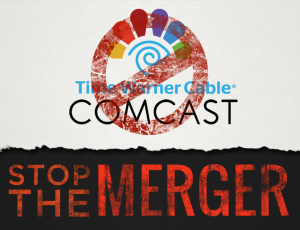

Net Neutrality – Time Warner/Comcast Merger
A merger of media cable giants Comcast and Time Warner Cable threatens net neutrality. Comcast intends to take over Time Warner for more than 44 billion dollars in stock. This proposed merger would unite the nation’s largest cable TV and internet service provider with the second largest cable company. If combined, these companies would offer service to two thirds of U.S. households. The deal must be approved by the U.S. Justice Department and the FCC.
Attorney Matt Wood:
- What we would have here is a 45 billion dollar deal combining the nation’s largest and second largest cable company.
- They face some competition especially from video from satellite providers.
- The place where they don’t face competition at all is on the broadband platform.
- This deal would strengthen them both in their cable TV programming dominance and on the broadband side too.
- You’d have one company that reaches two thirds of the country and its the only option some people have for advanced communications services, putting video and broadband together.
- That would give tremendous power of everything we see on both TV and online. Comcast is already a must have for any independent programmer.
- For even web providers such as Netflix.
- Even without that horizontal competition today between Comcast and Time Warner cable this is not good news for the American people, for free expression, for lower prices, for anything we care about.
- Net-neutrality means preventing unreasonable discrimination against content.
- Verizon went to court and had these net neutrality rules struck down that the FCC put forward.
- They (Verizon) said they internet is really like a newspaper than it is like a phone system and what that means is that we at Verizon should have editorial discretion over the internet content we transmit.
- An internet service provider used to be somebody you went to who rode over the top of an open phone system. Right? Back in the dial up days there were a number of internet service providers and you could switch from one to the other.
- Internet content should not be regulated by the Federal Communications Commission full stop yet the communications network that we all use to get online is something where have to have a public oversight role and a certain degree of universality, affordable and openness.
- Susan Crawford talks about these issues as well. She said “What the companies want to do is confuse the conversation for the sidewalk.”
- We need these rules to keep open the sidewalks, to keep open the public spaces and this concept of public communications network that serves everybody.
- The twin review by the FCC and the Department of Justice might seem cumbersome but they have different mandates.
- DOJ and the FTC are looking to prevent a decrease in existing competition.
- The FCC has a broader mandate to make the sure the deal is actually in the public interest.
- Comcast bought up NBC only 3 years ago. Since then, AT&T tried to acquire T-mobile.
- Verizon has almost 50 percent of the entire (wireless) industry’s profits.
Guest – Attorney Matt Wood helps shape the policy team’s efforts to protect the open Internet, prevent media concentration, promote affordable broadband deployment and prioritize a revitalized public media. Before joining Free Press, he worked at the public interest law firm Media Access Project and in the communications practice groups of two private law firms in Washington, D.C. Before that, he served as editor-in-chief for the Harvard Civil Rights-Civil Liberties Law Review, worked for PBS, and spent time at several professional and college radio and television stations. Matt earned his B.A. in film studies from Columbia University and his J.D. from Harvard Law School.
—————————————————————
—
Civil Liberties, Criminalizing Dissent, Death Penalty, FBI Intrusion, Habeas Corpus, Human Rights, Political Prisoner, Prison Industry, Targeting Muslims, Torture
Podcast: Play in new window | Download
Updates:
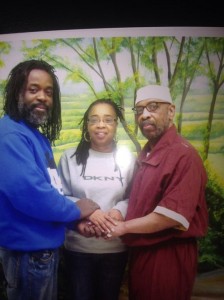
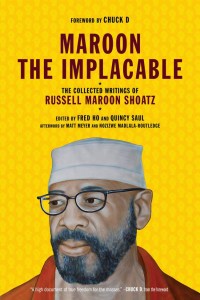
Russell “Maroon” Shoatz Released Into General Population After 22 Years of Solitary
Here on Law and Disorder we’ve been keeping you updated on the campaign to release Russell “Maroon” Shoatz from solitary confinement. We’re heartened to broadcast the news that he has been released from solitary confinement and is now in the general prison population. Maroon has spent 40 years in the U.S. prison system and 22 of those years were spent under intense lock down. He was allowed only one hour a day outside of that cell. In May of 2013 Maroon brought a lawsuit on the grounds that he was subjected to cruel and unusual punishment in violation of the Eighth Amendment of to the U.S. Constitution and that he was denied his legal rights to proceed with a case.
Attorney Bret Grote:
- We had a legal phone scheduled to take place Thursday February 20, when we received notice from the prison that the housing unit that he was in. The restricted housing unit was not going to be able to facilitate that phone call because he was not longer on the unit.
- I received a call from him at 1PM confirming that he had been released from solitary confinement just hours before that very morning. We notified his family. That same night he had his first contact visit in more than 20 years when his son Russell III, and his daughter Sharon were able to go see him. There’s a real wonderful picture of the 3 of them circulating on the internet.
- A constellation of forces and various tactics and strategies that had been deployed over a course of 3 years of renewed, reinvigorated effort to get Maroon out of solitary confinement.
- It started back in August of 2010 when State Representative Ron Waters held a hearing on solitary confinement in front of the House Judiciary Committee and Maroon’s daughter Theresa Shoatz was there and seeing former survivors of solitary confinement and advocates testify in the presence of DOC officials and state legislators inspired her.
- She said on that very day. I remember it crystal clear. “I’m going to get my Dad out of solitary.”
- That began a series of advocacy efforts including phone calls, including action alerts that saw the construction of a coalition of more than 30 organizations including the National Lawyers Guild, the Center for Constitutional Rights, the Human Rights coalition in Pennsylvania.
- There was no change in condition or indication that anything was going to change until late March of 2013. What had been happening at that time was Maroon was getting increasing visits from lawyers. There were more correspondence coming from the legal team.
- Right when we were about to send the Department of Corrections our demand letter that he be released in 30 days or else they’d be hit with a civil rights lawsuit, they abruptly without any notice that this was going to happen, transferred him from the state correctional institution at Greene where he’d been for 18 years to SCI Mahanoy.
- In my experience of 6 years of being a human rights advocate for prisoners in Pennsylvania, I’ve never heard of prison officials going to somebody in the solitary units and telling them we’re going to do what you want.
- In the process of constructing this massive imperial prison state they have resorted to similar ideology, punitive ideologies and tactics to manage that prison population once they’re behind the walls, and that includes widespread use solitary confinement in a way that is qualitatively different than it had been used throughout most of the 20th century.
- It had been used as a long term affirmative strategy for managing the prison population for warehousing for people that were problematic for prison officials because maybe they filed a lot of grievances, or they were jailhouse lawyers, maybe they were political prisoners or dissidents . . .
- In the 30 years that this has been ongoing, there have been waves of activism that really at the outset were led by people like Bonnie Kerness, director of AFSC’s Prison Watch Project.
Guest – Attorney Bret Grote, a member of the Russell Maroon Shoatz legal team and the Abolitionist Law Center. Bret has worked with the Human Rights Coalition since 2007 as an investigator, organizer, and researcher. He was the Isabel and Alger Hiss Racial Justice Fellow at the Center for Constitutional Rights in 2012. He graduated from the University of Pitt Law School in May 2013 and was recognized as the school’s Distinguished Public Interest Scholar.
—–


U.N. Expresses “Deepest Concern” over Widespread Sexual Abuse by Clergy
Here on Law and Disorder we continue to report on the work of the Center for Constitutional Rights and SNAP, the Survivor’s Network of Those Abused By Priests in bringing accountability within the Catholic Church for widespread sexual violence against perhaps hundreds of thousands of victims, mainly children. Recently, the Vatican was summoned before the United Nations Committee On the Rights of the Child to respond to allegations of systemic sexual violence and practices that have allowed abuse to continue.
Attorney Pam Spees:
- We were in Geneva with members of the Survivors network, those abused by priests because the Vatican was having to report to the UN Committee of the Rights of the Child for the first time ever on the issue of sexual violence.
- This is in the wake of more than a decade of scandals that have broken out in different parts of the world and investigations in different countries which really revealed that the Vatican has a system in place that actually facilitates this widespread sexual violence.
- The treaty set up a committee of independent experts. Their job is to see compliance with the treaty and review different countries that have ratified this convention, basically in a dialogue with them in how they’re complying with the treaty, protecting children’s rights.
- The committee had asked for data on the scope of sexual violence. The information the Vatican has about it. What was done in these cases, with individual priests but also evidence of higher officials who helped cover up these crimes around the world.
- Vatican officials are claiming that this is a thing of the past and that they’ve made changes. They point to 2011 when Pope Benedict issued a new set of guidelines, essentially an instruction to Catholic authorities around the world that they should comply with civil laws.
- We’ve seen similar types of policy and language in the U.S. We’ve seen similar language in Ireland. But what has happened in Ireland and the U.S. is in that realm, officials at the Vatican have overridden the national level bishops plan to require mandatory reporting of sexual violence.
- The same practices are happening behind the policies, and the policies have no teeth.
- You have a former archbishop in Wisconsin who has talked about shredding documents on a routine basis under sworn testimony, he had admitted to this, but the priest-shifting is just common. One former cannon lawyer said its part of the DNA of the church.
- We know sexual violence can occur in every institution but when you have a closed system like the Vatican that is saying it can police itself and its really not. It’s actually continuing to enable – they (the committee) got the way it was operating and that was really important for the survivors to be there and they called them out on that.
- It’s not just putting the blame on individual perpetrators, its about changing the system fundamentally and the way it operates.
- We’ve seen Vatican officials come out in two ways and criticize the report. One is the focus on the committees questions about non-discrimination issues.
- The treaty is a wide ranging treaty that sets out a number of rights that are to be protected, respected and fulfilled by the state’s parties.
- The Vatican has operated as a state when its convenient and then falls back to its religious entity status when its not convenient to be a state.
- What’s coming up next is UN Committee Against Torture has decided to call the Holy See for review. That will be happening in April, again in Geneva.
Guest – Pam Spees, senior staff attorney in the international human rights program at the Center for Constitutional Rights. She has a background in international criminal and human rights law with a gender focus, as well as criminal trial practice. She serves as lead counsel on several of CCR’s cases and initiatives including, Sexual Minorities Uganda v. Lively, a case brought against a U.S. based anti-gay extremist for his role in the persecution of LGBTI people in Uganda; Murillo v. Micheletti, a case brought by the parents of a youth killed by the coup regime in Honduras; and in the legal effort to hold Vatican officials criminally responsible for the crimes against humanity of rape and sexual violence within the church.
——————————————————————————————
CIA Sponsored Terror, Civil Liberties, Criminalizing Dissent, Crony Capitalism, FBI Intrusion, Guantanamo, Human Rights, NSA Spying, Political Prisoner, Prison Industry, Surveillance, Torture
Podcast: Play in new window | Download
Updates:
—-
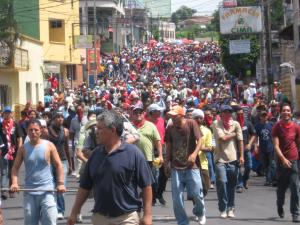

The Drug War: Policing and U.S. Militarism at Home and Abroad
Last week the Center for Constitutional Rights hosted an event titled The Drug War: Policing and U.S. Militarism at Home and Abroad. We’re joined by one of the panelists David Vivar, he’s an author and scholar at National Autonomous University of Honduras at the Faculty of Political Science and International Relations of the University of Calabria. His work focuses on the U.S. cooperation in the Honduran military coup of 2009 and the centrality of drug trafficking to state power in Honduras. What you will hear in this interview is that the U.S. Drug War has not only fueled mass incarceration and discriminatory policing practices here in the U.S. but also supports violence and militarization throughout Latin America. We get the details of that and David’s strategies to resist the racist, and devastating war.
David Vivar:
- It’s been constant that Congress asks to stop human rights violations.
- This goes all the way back to the simulation of the rule of law, to a democratic state.
- We have the highest murder rate in the whole world, and we have no war, not a consistent war declared except the war on drugs.
- We’re fighting a war that has turned the current conditions into a civil war.
- When you start having conflicts between drug lords, Mexican cartels and Colombian cartels – what do they do? They go to the space right in the middle, which is Central America and the northern triangle.
- Guatemala, Honduras and El Salvador have seen the consequences. We are the collateral damage.
- 79 percent of the cocaine that travels to the United States goes via Honduras. Basically what the Department of State is doing is investing money on kingpins and drug lords in the Honduran institutions.
- After the coup the military took back power and the U.S constantly supported this new democratic military civil alliance, which in the hand is what happened in Mexico.
- The (Honduran) military has drug lords of its own.
- Miguel Facusse is the most powerful man in Honduras. He’s got the Dinan Corporation which has African Palm plantations throughout the whole drug path.
- Basically the conflict around land is a failed agrarian reform.
- You have indigenous populations that lost their land. Their land was given to this man. The most powerful person, he gets the African Palm plantations which is the best place, as we know from wikileaks to establish small airports for aircraft to land there and deal with the drugs.
- The resistance is still in the streets against a lot of laws – the opening for business of the country – model cities and charter cities are something we’re fighting back in keeping our resources ours.
Laura Raymond:
- The U.S. did cut off military aid for a short amount of time directly after the coup but instead of backing the movement from the Honduran civil society for reinstatement of President Zelaya – throughout that summer and fall there was a huge movement, the streets were filled with people calling for the reinstatement of their president – the United States instead pushed for new elections that fall which was what ended up happening.
- The elections were heavily boycotted by civil society yet the U.S. was the primary force in the region for supporting those elections.
- After those elections took place and Pepe Lobo is elected as president, the U.S. reinstated their support for the Honduran military and police, despite massive human rights violations that were taking place on an almost daily basis.
- You really have a very close relationship between the Honduran military and police and the U.S. government and military.
- There have known to be drug planes that have landed on his property (Miguel Facusse) We know that the U.S.State Department knows about that because of wikileaks and the U.S. goes on to have this cozy relationship with him and the political arm of Honduras that he runs in.
- The World Bank continues to fund him and give him subsidies for the African Palm plantations. Where is the interest in stopping the drugs if you’re working with this person who there are drug planes landing on his property.
- He has a private army basically. He has all these private security contractors that implicated in murders. The Center for Constitutional Rights has laid those out in a report to the International Criminal Court, naming Miguel Facusse as a criminal that needs to be prosecuted.
- The U.S. depends on the Honduran government to have a very friendly government in the region. We have a lot of military presence there, we have a lot of bases. It’s a relationship that depends on the repression of civil society throughout Honduras.
- There’s a massive resistance movement that has taken a lot of repression in the last four years. What’s going on with the drug wars, its very dark and scary but the other side is this movement that David is part of.
Guest – David Vivar, is a sociologist, currently a scholarship holder from the National Autonomous University of Honduras at the Faculty of Political Science and International Relations of the University of Calabria, where he studies dependence, international asymmetry and the division between center and periphery nations. His articles and essays analyze media discourse and public opinion; the representative intermediations of Honduran democracy, the influence of U.S. cooperation in the military coup of 2009 and the centrality of drug trafficking to state power in Honduras and its inextricable relation with the neoliberal impoverishment and the ongoing usurpation of democracy.
Guest – Laura Raymond, has over fourteen years of experience organizing, writing, and advocating on social justice and human rights issues in the U.S. and internationally. Much of Laura’s work focuses on the impact of U.S. actors, corporations and government policies and practices abroad.
—–
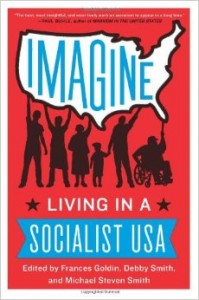
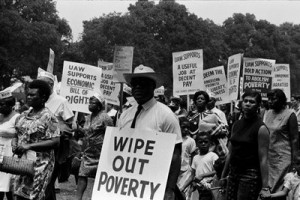
Imagine: Living In A Socialist U.S.A – Kazembe Balagune
In the past weeks we’ve featured contributors to the book Imagine: Living In A Socialist U.S.A. This book as many know was conceived and edited by Frances Goldin and our own Michael Smith with his wife Debby. We continue to discuss the essays in this ground breaking anthology. Today we speak with Kazembe Balagun, who wrote We Be Reading Marx Where We From: Socialism and the Black Freedom Struggle.
Kazembe Balagun:
- The chapter starts out with a short story on Paul Robeson at the Carnegie Hall in 1957. He sang a song called I Dreamed of Joe Hill last night.
- When we talk about Wall Street, the first commodity were Black slaves. The reason they called it Wall Street is to keep the Native Americans out.
- There’s always been an interweaving of Black freedom struggles in the socialist experience.
- One of the first socialist experiments happens in the Sea Islands of South Carolina and Georgia where General Butler issuing Article 15 calling for all land held in common for negros.
- Then you have John Brown issuing an alternative constitution of the United States which calls for all land to be held in common between blacks and whites.
- Martin Luther King Jr (in a speech said) there has to be some form of socialism in the United States in order to achieve economic democracy.
- The Poor People’s march going forward in 1968 in his fight for Memphis, these are all parallels for economic democracy.
- What we find today is that these socialist ideas are prevalent in the African-American community.
- I think there’s a way we can excavate this history for our own social movement.
- This capitalist society really has little to offer people, particularly young people of color.
- I always take into account is that there’s always been a tradition of African-American prophetic tradition which always looks beyond what’s been given to us and looks at the condition of possibility.
Guest – Kazembe Balagun, an activist and cultural organizer from the Bronx and former program director at the Brecht Forum. He is currently the project manager at the Rosa Luxemburg New York Foundation.
———————————————————
CIA Sponsored Terror, Civil Liberties, Criminalizing Dissent, FBI Intrusion, Guantanamo, Habeas Corpus, Human Rights, Political Prisoner, Prison Industry, Surveillance, Targeting Muslims, War Resister
Podcast: Play in new window | Download
Updates:
——–
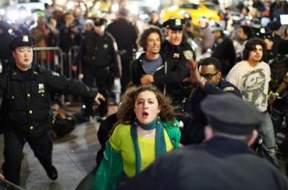
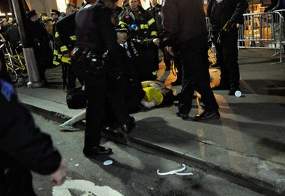
Jury Trial Begins for Occupy Wall Street’s Cecily McMillan
Cecily McMillan faces 7 years in prison after being beaten by the New York Police that left her unconscious at an event marking the 6 month anniversary of the occupation in Zuccotti Park. The Occupy Wall Street activist is charged with felony assault on a police officer a Class D felony in New York. In the course of her arrest McMillan sustained bruised ribs, a seizure and numerous cuts across her body. McMillan was a political organizer and activists speculate that’s why the prosecutor is seeking the full penalty.
Attorney Marty Stolar:
- Cecily is indicted which is somewhat unusual in the Occupy Wall Street cases. There are only 2 serious felonies that made it through the indictment process, Cecily’s is one of them.
- She’s accused of assault in the second degree. She’s accused of assaulting a police officer with intent to disrupt his ability to perform his official duties. She wacked him in the face with her elbow and left a good sized mouse under his left eye, causing him substantial pain and also to miss some work.
- The circumstances however under which she delivered the blow to his cheekbone are what the trial is about.
- Cecily is not the kind of person who would assault a police officer just for the hell of it.
- The police at midnight decided to clear the park of all the people who were there to celebrate the anniversary. Cecily was there not necessarily to celebrate the anniversary but to meet somebody to continue her pub crawling on St Patrick’s day being a McMillan when Cecily is grabbed from behind on her right breast and jerked upwards and she reacts, her arms go up in the air, her elbows go up, and that’s when her elbow and that’s when the elbow makes contact with the officer’s cheekbone.
- At that point Cecily is knocked down to the ground hits her head on the sidewalk and really has no memory of what has occurred until she wakes up somewhat later in a hospital.
- All of sudden she realizes she’s got bruises all over her body. She’s got a bruised rib, cuts all over her back, bumps on her head, she really has no idea how they occurred.
- Cecily for whatever reason was singled out to be prosecuted for a felony and they didn’t offer her a decent plea in the case.
- The officer lost a couple days of work, he was back on the job, his vision was not impaired.
Guest – Attorney Marty Stolar is a criminal defense lawyer and former president of the New York chapter of the National Lawyers Guild.
——
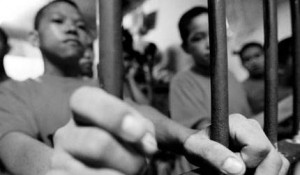
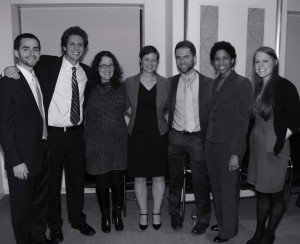
Fair Sentencing Of Youth Campaign
Here on Law and Disorder we’ve been covering the issue of children being sentenced to prison for life without parole for an offense committed during adolescence. The United States was the only country in the world to mete out life without parole to juveniles. But, in the last few years, the United States Supreme Court acted to curb the use of mandatory life sentences for juveniles. It accepted the argument that children, even those who are convicted of murder deserve a chance at redemption. However most state courts are not following the spirit of the recent Supreme Court decision. In Florida, which is the number one state that puts children in prison for life without the possibility of parole, several lawsuits have been brought accusing the state of handing out massive sentences in non-homicide cases that they basically amount to life without parole.
Jody Kent Lavy:
- The youths were involved in homicide cases, Human Rights Watch estimates that 25 percent of those individuals were convicted of felony murder meaning they were the primary perpetrator or they were there at the time the crime was committed but weren’t the trigger men.
- The majority of them 60 percent had no prior record.
- This most extreme sentence has been imposed on people we could not define as our most serious offenders.
- June of 2012 the Miller v Alabama decision was issued which struck down mandatory life without parole sentences for children.
- Each of these cases the court has relied on a growing body of research that really articulate the fundamental differences between children and adults.
- We know that the vast majority of them tend to grow out of any criminal behavior.
- The court has said we can’t impose these most extreme sentences on our children.
- The court has said that children are constitutionally different when it comes to sentencing.
- Two thirds of the people serving these sentences are concentrated in just five states.
- In Pennsylvania the state that leads the nation in this practice there are 500 serving this sentence.
- Back in the 1990s there was this theory known as the super-predator theory that there was going to be this juvenile crime wave.
- The super-predator theory has since been dis-proven by the criminologists who were even the authors.
- We now have an opportunity to be really mindful and careful about how we implement policies at the state level that hold young people accountable for serious crimes.
- Some legislatures have abolished life without parole altogether, Wyoming, Texas, Delaware among them. Some states have reacted in imposing the next available harshest sentence.
- The Mendota Juvenile Treatment Center in Wisconsin.
Guest – Jody Kent Lavy, director of the Campaign for the Fair Sentencing of Youth, the organization calls on states to reconsider mandatory terms dispensed before the Miller ruling.
——————————————————————–
CSPAN Book Club Video – Imagine: Living In A Socialist U.S.A.

CIA Sponsored Terror, Civil Liberties, Criminalizing Dissent, FBI Intrusion, Guantanamo, Habeas Corpus, Human Rights, Iraq War, Political Prisoner, Prison Industry, RFID, Supreme Court, Surveillance, Targeting Muslims, Torture, War Resister
Podcast: Play in new window | Download
Updates:
——–

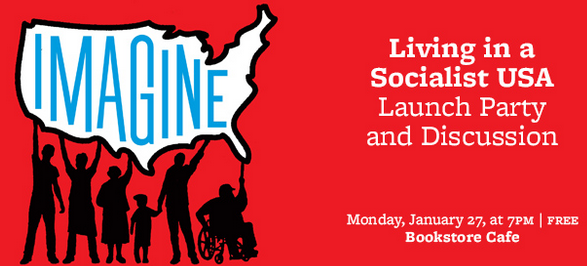
Imagine: Living in a Socialist USA-Frances Goldin, Michael and Debby Smith
Our own co-host Michael Smith, his wife Debby and Frances Goldin have assembled and edited an anthology of powerful essays titled Imagine Living In A Socialist USA. Prominent thinkers, activists and artists have given their perspective of what the United States would look like through the lens of a socialist society. This new work is an important contribution to what we hope will be a broader movement. It includes an indictment of capitalism, an alternative U.S.A. and how to get there.
Frances Goldin:
- It was my brainchild because I wanted to accomplish 3 things before I joined by ancestors. One is everyone who lived in Cooper Square who had been fighting Robert Moses and saving their old tenements since 1959 its been a tremendous long struggle.
- This is the only community land trust in the Northeast. The only one.
- The next one is that I was really distressed at the direction our country was moving. Here I am 89 years old and all of a sudden North Carolina says that we’re going back to the old days where you had to bring in your right arm and read the Constitution without missing a word in order to vote. That plus spying on every American and continuing the wars.
- It was just breaking my heart. I was very distressed that everybody thought that socialism was a dirty word, it was an undemocratic terrible way of life and they just didn’t have a clue as to what it really meant.
- I thought it would be a great idea to pull together some of the greatest minds in the country and let them talk about health, education, welfare, homosexuality, every subject that effects American’s lives and explain how it would be different under socialism if it were democratically done, which is the only way it should be done.
- Within one year, 31 leading brains in the United States for no charge, they did it free, wrote their essays on each one of these subjects. The book is in my hand, its finished and its beautiful and it makes me so happy. That’s my second accomplishment.
- The third one is to see one of the leading intellectuals in the world free, forever free. Mumia Abu-Jamal.
- I couldn’t do it alone, it was a great plan and so I leaned on to dear friends, Debby and Michael Smith.
- I had to force Harper Collins into this, they really didn’t want to do it.
- We were very lucky to hire an incredibly good editor, whose livelihood was editing for magazines and newspapers. If a sentence was too long, he cut it into 2 or 3 sentences.
- Right now, the word socialism, people think of dictatorship, they think terrible things, they think undemocratic.
- This is a simple instruction about how it would effect us with regard to health, education, housing, welfare, all of those subjects which make it so difficult for all of us to live.
- It can’t be a dirty word, it happens to be the most democratic way of governing possible.
- Get the workers to run the company. It’s happening in Spain, with dozens of corporations that have become worker owned.
- It’s going to be the workers dividing the profits among themselves.
- It will only happen when the workers are angry enough and informed enough to know that they can run the show.
- Every penny of the royalties will go to free Mumia Abu-Jamal
- We are not earning one dime from this book. It was a labor of love. It was a labor of activism.
- It was a labor to change the world and make it a better place.
Guest – Frances Goldin is the President & Principal of Frances Goldin Literary Agency. Frances has worked in publishing for 63 years, as an agent and as editor-in-chief of a children’s publishing company; she founded the Frances Goldin Literary Agency and sold her first book in 1977. Authored by Black anthropologist Betty Lou Valentine and titled Hustling and Other Hard Work, the book continued to receive royalties for 32 years. One of the agency’s strengths is that many of its books continue to earn royalties long after publication. Reflecting Goldin’s radical politics, the Agency concentrates on literary fiction and serious, controversial, progressive non-fiction.
—–
Attorney Michael Smith:
- I don’t think its a dirty word, because people see what’s going on under capitalism and they don’t like it. The economic situation in this country ain’t gonna change, its only going to get worse.
- Frances is quite an influential literary agent in this country.
- What’s your definition of socialism? I said a democratic economy and political system, both where people from the bottom up control how we make a living, and how we live.
- We’re having a book launch on January 27. It’s at 126 Crosby Street in SOHO at the book store called Housing Works.
- In order to achieve the kind of socialism we’re talking about and that’s socialism from the bottom up you need a broad democratic movement of people.
- All the left wing parties, all the movement groups, we gotta get together around a common program.
- One of the chapters that I really like, and this isn’t to flatter you Michael Ratner, but you wrote a chapter on what I would do if I was US Attorney General.
- Paul LeBlanc writes his chapter about the 3rd American revolution. Diane Feeley writes about that in her chapter. She’s an auto worker retired from Detroit.
- Michael Zweig, the great sociologist, we reprint his speech from Occupy Wall Street where he talks about the 1 percent, the ruling class.
- He says actually its 1/10 of 1 percent. Those are the people who are the top of the economy and different organizations in this country. He said, you gotta be very careful, because these people will kill ya.
- In the second part of the book, we emphasize use your imagination. How do we organize the economy democratically?
- How do you organize a corporation democratically? Rick Wolff wrote that chapter.
- There are 31 chapters in the book. The last chapter suggests itself. How do we do it?
- We’re not against leadership, we’re against undemocratic leadership but you need people who’ve had some experience and who can draw the lessons of the past.
Guest – Attorney Michael Smith is co-host of Law and Disorder, and a New York City attorney and author. His most recent book, written with Michael Ratner , is Who Killed Che? How The CIA Got Away With Murder. He is on the boards of the Center for Constitutional Rights, and the Brecht Forum. He was educated at the University of Wisconsin in the 1960s, where he learned social history from the great teacher Harvey Goldberg. He has testified on Palestinian rights before committees of the US Congress and the United Nations.
Guest – Debby Smith is a long time socialist since going to college in Boston during the radical sixties. Debby worked full-time for the anti-Vietnam War movement, the Kent State Legal Defense Fund and in the feminist, union and socialist movements. She is also the wife of Michael Smith and participates in the anti-capitalist and pro-democracy movements that are growing rapidly in the United States and worldwide.
————————————————————————————————————
Afghanistan War, CIA Sponsored Terror, Civil Liberties, FBI Intrusion, Habeas Corpus, Human Rights, Surveillance, Targeting Muslims, Truth to Power
Podcast: Play in new window | Download
Updates:
- Lynne Stewart Released From Prison, Returns Home
- Media, Pennsylvania Activists Come Forward
- White House Report: “Liberty and Security in a Changing World”
——
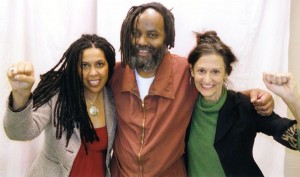

Mumia Abu-Jamal, Heidi Boghosian and Professor Johanna Fernandez
We at Law and Disorder have kept you updated on his case for the 10 years we’ve been broadcasting. It’s our pleasure to welcome Mumia Abu-Jamal as our special guest. Professor Johanna Fernandez joins us as Mumia calls from SCI Mahanoy in Frackville, Pennsylvania. Johanna is a Professor of History at Baruch College and co-coordinator of the newly launched campaign to bring Mumia home.
Mumia Abu-Jamal:
- I remember with quite a degree of distinction receiving in the mail, a packet full of xeroxed FBI files.
- I believe by 1971, I had left the party. I read through files that named names and detailed internal affairs of the Black Panther Party of Philadelphia, the national office, other organizations, activists all through out the city and the region.
- We lived in communal apartments and houses. We lived together we worked out of the same offices, we spent all day together with each other.
- To read about lies that were in those files, and the people that you knew for years that were FBI informants, stuff like that, it was absolutely mind blowing.
- Media, Pennsylvania story: I think they are the linear ancestors of Edward Snowden.
- These were anti-war people for the most part, living their own lives but willing to make a contribution to the movement, because they were part of the movement.
- It’s interesting that these file come out now, because for someone who has been reading and writing recently, about the Reverend Dr. Martin Luther King Jr., people know now that the FBI taped hotel rooms where Martin and Ralph David Abernathy and other civil rights activist were staying.
- They tried to use those tapes to blackmail Martin King and actually force him into suicide.
- This was all part of Hoover’s plan to destroy the Black Freedom Movement and any movement that was against what the government was doing.
- It’s interesting that Law and Disorder is talking about 9/11 when right there in New York you have an estimated 100 cops who used 9/11 to justify scamming the public. Cops, prison guards and a few firefighters.
- When you think about the ordinary heroes. These are people whose names are not known. Those nameless black mothers, grandmothers, sisters and daughters, they made that movement possible. (Black Freedom Movement)
- Even if you think of Edward Snowden. He’s an average guy, no college education, he’s like a computer whiz. Now he got a great job and he resolved in his mind, in his heart, in his soul, that he would not be silent about the things he saw and heard.
- BringMumiaHome.com
- Law and Disorder Interview – The Framing of Mumia Abu Jamal by J.Patrick O’Connor
Guest – Mumia Abu-Jamal is a renowned journalist from Philadelphia who has been in prison since 1981 and was on death row since 1983 for allegedly shooting Philadelphia police officer Daniel Faulkner. After decades of appeals, he left death row in 2012 but is still facing a life sentence. He is known as the “Voice of the Voiceless” for his award-winning reporting on police/state violence brutality and other social and racial epidemics that plague communities of color in Philadelphia and throughout the world.
——
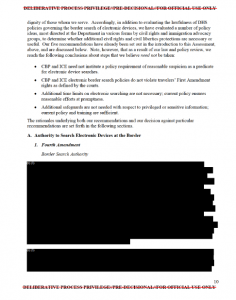
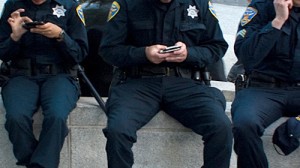
Federal Court Allows For DHS Laptop Searches At Border
Each year, thousands of American citizens returning from abroad are subjected to searches of their laptops, cell phones and other personal devices. The Department of Homeland Security claims it has the right to such searches regardless of whether the traveler is suspected of wrongdoing.
A federal court recently dismissed a 2010 lawsuit against the DHS. The ACLU, and the National Association of Criminal Defense Lawyers, filed the suit on behalf of Pascal Abidor, a dual French-American citizen whose laptop was searched and confiscated at the Canadian border, as well as the National Press Photographers Association and the NACDL. Abidor was traveling from Montreal to NY on Amtrak when his laptop was searched and taken by customs officers. He was questioned, taken off the rain in handcuffs and held in a cell for several hours. When his laptop was returned, many of his files, chats and photos had been searched.
Attorney Brian Hauss:
- The agent opened Mr Abidor’s laptop and started looking through the files on his desktop.
- She found a couple pictures that she showed to agents around her. She turned the laptop around to see what he thought about the pictures she identified.
- One was a picture of a Hamas rally in Israel, and the other picture was of a Hezbollah rally in Lebanon.
- Mr Abidor explained that these were related to his graduate work in Islamic studies.
- The agents thought these pictures were suspicious, and they took Mr. Abidor off the train, the train left without him. They put him in handcuffs and placed him in a holding cell where he was forced to wait for several hours.
- While he was there, the agents interrogated him about his studies, his associations, his interests in Islam, etc.
- Eventually they decided there was no evidence of wrong doing. They decided to let him go but not before seizing all his electronic devices and specifically detaining his laptop for an indefinite period of time.
- When they returned his laptop 11 days later he was able to determine from the last open date on his files, that the government had actually inspected his personal photographs a transcript of a chat he had with his girlfriend, copies of his email correspondence, class notes, journal articles, tax returns, his graduate school transcript and even his resume.
- He decided to come to us and we brought a lawsuit on his behalf challenging this policy.
- David House is a very talented computer programmer who lives in Cambridge, Massachussetts and he was at one time deeply involved in the Bradley Manning support network.
- The government figured out that David House was related to Chelsea Manning and they wanted to question him in connection with the Wikileaks investigation.
- They set up an alert in the data base, known as the Text Database. It let the government know whenever Mr. House was leaving the country.
- When Mr House returned (from leaving the country) government agents were waiting for him at Chicago O’Hare.
- They interrogated Mr. House about wikileaks and his political activities and confiscated his laptop and electronic devices.
- When we brought a lawsuit on Mr. House’s behalf and actually settled with the government, the DHS notes after reviewing all of his materials after going through every file on his laptop . . concluded there was absolutely no evidence to seize these devices. There was strong reason to believe they knew this from the beginning and they knew they couldn’t get a probable cause warrant by a judge.
- As we understand it, the DHS can put anyone it likes into the Text Database.
- Our understanding is that from October 1, 2008 to June 2, 2010 more than 6,500 people.
- What we asked for in our FOIA request was the DHS Civil Rights and Civil Liberties Impact Report on border searches. We ultimately got the report with some redactions pertaining to the government’s legal analysis of why its allowed to engage in suspicionless searches.
Guest – Brian Hauss, the William J. Brennan Fellow with the ACLU’s Speech, Privacy, and Technology Project. At the ACLU, he has been involved in litigation challenging the federal government’s suspicionless search and seizure of laptops and other electronic devices at the international border. Brian is a graduate of Yale University and Harvard Law School. After graduation from law school, he served as a law clerk to the Honorable Marsha Berzon of the United States Court of Appeals for the Ninth Circuit.
——————————————————————————————
Books From Law and Disorder Hosts
